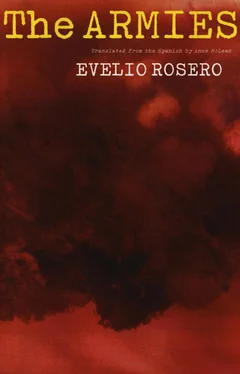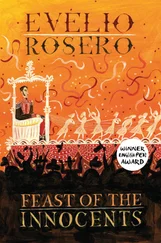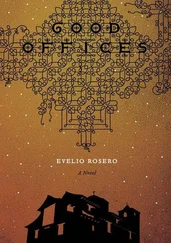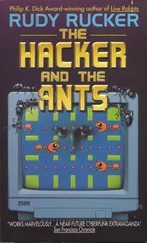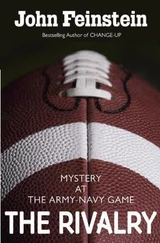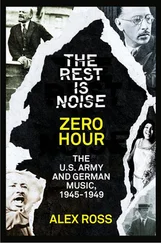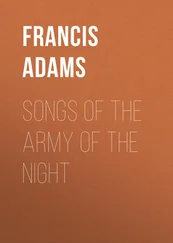I only met Geraldina’s brother; I saw him arrive from Buga in his car, a rainy night; tall, bald, worried; he managed to cross the last stretch of highway with a safe-conduct pass from the guerrillas; I heard him sound his horn three times and looked out of the window: Geraldina came out, with a candle in her hand; they embraced. And they went into the house, both carrying, with effort, an enormous black plastic bag, with Geraldina’s money in cash, her money and her husband’s, she told me with sudden fury, the money earned by the couple through years of work, profesor , never any wrongdoing.
The same night of his arrival, Geraldina’s brother, a startled shadow, left San José the same way he came, in his car, in the rain, the safe-conduct taped to the inside of the windscreen as if it were a flag. He argued with Geraldina about the advisability of leaving Eusebito with her. Geraldina was willing to let him go, but the boy wanted to stay with his mother.
"I explained to him what the risks were, I explained it to him as to a little man.” Geraldina is proud, in her innocence. “And Eusebito had no hesitations: with his papa and his mama till death.” Geraldina’s mouth half opens, her eyes go further off into the sky: “I haven’t got a peso left, profesor , that’s what I’m going to tell them, they’ll have to take pity, and if they don’t take pity, let them do what they want, let them take me with him, that would be preferable, the three of us together, as it was meant to be, than to wait years not knowing how long, and Eusebito will go with me, that’s my last card, they’ll take pity, I’m sure, I’ve given them everything, I’m not hiding anything from them.”
Now Geraldina has begun to cry: for the second time today a woman is crying in this house.
And while she cries I see my hand on her knee, without really seeing it — I discover that, in one second — but all of a sudden I see it, my hand still on Geraldina’s knee. Geraldina, who cries and does not see or does not want to see my hand on her knee, or she is seeing it now, Ismael, you are so shabby that all that matters is her knee, never the tears for her missing husband, not even Geraldina’s senseless but irrefutable joy: to say that her son will accompany her like a little man, whatever may happen, and to say it without her voice breaking, what would her husband think? What a disappointment: “Pack up everything and get out of here,” something like that Eusebito said his father said, Geraldina’s delirious voice moves me, the two of us in the middle of the ruins, among the remains of flowers, both the same.
“Hortensia offered me a lift in the helicopter with her, profesor . Of course, I am not taking it, I could not. But today I won’t deny it: I am afraid.”
She is staring at my hand on her knee.
“You,” she says, or asks.
“Yes?”
And again the fleeting laugh.
“You’re not going to die, profesor ?”
“No.”
“Look how you’re trembling.”
“It is the emotion, Geraldina. Or it is my lechery, as Otilia would say.”
“Don’t worry, profesor . Stick with love. Love conquers lechery.”
And, tenderly, I remove my hand from her knee. But she stays there, in silence, sitting beside me.
Her son called her, from the other side of the wall: it seemed he had just fallen in the empty pool, or was it a game? His voice sounded as if he had just fallen into the pool, and then a shout, nothing more. Geraldina returned immediately, ducking through the breach in the wall, her body as if carved in mourning. I did not follow her: another would have, not me, not anymore: what for? Besides, I was hungry, hungry for the first time; when was the last time I ate? I went to the kitchen and looked for the pot of rice: there was one plateful left, the grains looked hard, damp, burnt. I ate them with my hand, cold, leathery, and I sat there for a while, in front of the stove. For a long time now the Survivors had not appeared in the house, no doubt due to the lack of food, of attention. They would have to take care of themselves. But I missed their meowing and their eyes, which brought me close to Otilia, kept me company: thinking of them was like invoking their memory, palpable in the kitchen, where traces of feathers, like a trail in a fairy tale, led me into my bedroom: there, at the foot of the bed, lay two mangled birds, and on the pillow, the remains of black butterflies, an offering of food the cats had left for me. This is all I needed, I thought, for my cats to feed me: if I do not take care of their lunch, they take care of mine. If I had not eaten that rice, I would not have hesitated to finish plucking those birds and roast them. I picked up the birds, the butterflies, swept up the feathers, then I wanted to sleep, I stretched out face down, I think I was just about asleep when a woman’s scream from the street summoned me, everyone is screaming, I said to myself, and left the house as if stepping out into hell.
A woman was running, pressing her apron against her thighs — or wiping her hands on her apron — what was she fleeing? She was not fleeing, but running, because she wanted to see something.
“Have you heard, profesor ?” she said.
I followed her. I wanted to see too. We arrived at Chepe’s shop, and there, sitting in the aisle, before the tables, which were in disorder as if they had been blown about by a gale, Chepe clutched his head in his hand, surrounded by onlookers. “They must have found his wife, but dead,” I thought, as I saw him in the midst of desperation: it was not hot; an abnormal wind responded to Chepe’s hoarse groaning, and the dust swirled around his shoes. The small group of men and women were waiting: it was like a lacerated silence, because the questions would return, the timid comments. I too had questions: early that morning they had delivered to Chepe, under the door, like a final warning, the index fingers of his wife and daughter in a bloody paper bag. I want to give Chepe my condolences, but Hey approaches from among those present and takes me by the arm. The last thing I want is to chat with Hey, especially in these circumstances, but his dazed face, his hands on me, convince me; I remembered how I had felt sorry for him the last time I spoke to him, in a similar way, without remembering who he was, or why.
“ Profesor ,” he said into my ear, “they didn’t kill you while you slept?”
“Of course not,” I managed to say once I had recovered from the question. And I tried to laugh: “Do you not see that I am here with you?”
And, nevertheless, we stood looking at each other for a few seconds, as if we could not believe it.
“And who was going to kill me?” I asked. “And why?”
“That’s what I was told,” he replied.
He did not seem drunk, or drugged. Pale, his good eye blinked, without taking it off mine. His hands would not let go of my arm.
“What kind of joke is this?” I asked.
And he: “Then you’re alive , profesor .”
“Still,” I said.
And he, out of the blue: “You know something? I’ve never killed anyone.”
“What?” I asked.
He said: “Pure lies, to attract customers.”
I remembered with difficulty what he was referring to. “Well, you drove them away,” I said. “We all thought you sliced throats.”
I pulled my arm out of his hands. Nobody was listening to us.
“I’m glad you’re alive , profesor ,” he went on to say.
He looked like a punished child, provoking inexplicable pity. I left him there, with his unprecedented question, his blinking eye; he turned his back on the people and left; I forgot him.
“So they killed me while I slept,” I said aloud, and for an instant I was convinced I was telling Otilia: “I never had that pleasure.”
Читать дальше
